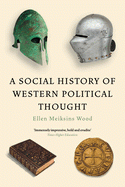Para envío
In this groundbreaking work, Ellen Meiksins Wood rewrites the history of political theory, from Plato to Rousseau. Treating canonical thinkers as passionately engaged human beings, Wood examines their ideas not simply in the context of political languages but as creative responses to the social relations and conflicts of their time and place. She identifies a distinctive relation between property and state in Western history and shows how the canon, while largely the work of members or clients of dominant classes, was shaped by complex interactions among proprietors, labourers and states. Western political theory, Wood argues, owes much of its vigour, and also many ambiguities, to these complex and often contradictory relations. In this new edition, incorporating both volumes, the book takes us from classical antiquity to the age of enlightenement. In the first volume, Wood traces the development of the Western tradition from classical antiquity through to the Middle Ages in the perspective of social history--a significant departure not only from the standard abstract history of ideas but also from other contextual methods. In the second volume, Wood moves on to explore the formation of the modern state, the rise of capitalism, the Renaissance and Reformation, the scientific revolution and the Age of Enlightenment. In her focus on canonical thinkers through the ages, Wood illuminates a rich and provocative legacy of political ideas unmatched in Western history--Publisher's website.



